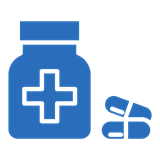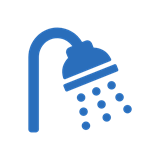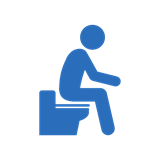A hysterectomy is an operation to remove your uterus. This operation is recommended to treat or control cancer.
In the past, a hysterectomy always required a large incision in the lower stomach area. Newer methods of the operation are minimally invasive, which means the operation is performed through small incisions. Benefits of a minimally invasive hysterectomy include less pain and scarring, less time in hospital, faster recovery and less chance of bleeding and infection.
Pre-Admission Visit
You will have an appointment at the
Pre-Admission Clinic 1 to 3 weeks before your operation. This visit is very important to assess your health and help you prepare for your operation and recovery. Plan for your visit to take
2–5 hours. On the day of your pre-admission visit, take your medications and eat as usual, unless you were given other instructions.
IMPORTANT: Unless you are given other instructions, you must come to your Pre-Admission Clinic visit or your surgery may be cancelled
What should I bring to my pre-admission appointment?
- Your health card (OHIP card). If you do not have an OHIP card, please bring another form of government-issued photo ID, such as a driver's license or passport.
- Any other insurance cards. You will need the policy number of your extended health insurance, if you have any.
- Your spouse/partner, a trusted friend or family member (to offer you support and be a second set of ears).
- All the medications you take in their original containers. This includes prescription medications, over-the-counter medicines, vitamins, supplements and herbal or natural products.
- A copy of your power of attorney for personal care and/or advanced directives.
- A list of any questions that you may have about the operation and recovery.
- The name or phone number of your pharmacy, as well as any medical specialists that you have seen in the past 3 years.
- If you have had a cardiac stress test, echocardiogram and/or a pulmonary function test in the past 3 years, it would be helpful to bring a copy of the final report with you to this appointment.
What happens during my pre-admission visit?
- You will have blood tests and routine skin swabs. The swabs are taken from your nose and other areas of your body to check for germs that can cause infections.
- You may also need an
electrocardiogram (ECG) to check your heart and a chest
x-ray to check your lungs.
- You will meet many health care providers during your pre-admission visit. Please feel free to ask them any questions that you may have.
- A pre-admission nurse will review your health history and give you information to prepare you for your operation, including directions for cleaning your skin, eating before your operation, taking your medications and pain management.
- A pharmacist will review your medications.
Depending on your needs, you may also meet:
- An anesthetist who will review your health history, discuss your anesthetic plan and pain relief after your operation.
- A member of the medicine team, if you have other complex health problems.
WHAT SHOULD I DO THE DAY BEFORE MY OPERATION?
- Please remove all nail polish and body piercings.
- If you smoke, do not do so for 24 hours before your operation.
- Do not drink alcohol for 24 hours before your operation.
- Your surgeon will tell you to do one of the following:
- No bowel preparation:
- Eat or drink as usual until midnight.
- Do not have anything to eat or drink after midnight.
- No bowel preparation, clear fluid diet:
- Starting at breakfast, have clear fluids only until midnight.
- Clear fluids can include water, apple juice, broth, soda and Jell-O.
- Do not have any solid foods, milk or milk products.
- Do not have anything to eat or drink after midnight.
- Bowel preparation and clear fluid diet:
- Buy your bowel prep at the pharmacy before the operation. Keep it in the fridge.
- Follow the bowel prep instructions given to you at the surgeon's office.
- Starting at breakfast, have clear fluids only until midnight (water, apple juice, broth, soda and Jell-O). Do not have any solid foods, milk or milk products.
- Start to drink the bowel prep at noon. It will start to work in 1 to 4 hours. Plan to be near the toilet during this time. You will have frequent, watery bowel movements.
- It is important to continue drinking clear fluids to replace the fluids lost with frequent bowel movements.
- Do not have anything to eat or drink after midnight.
Stop smoking before your surgery: learn how smoking and tobacco can affect your recovery after surgery, and how
quitting can improve your health.
WHAT SHOULD I DO THE DAY OF MY SURGERY?
Arrive 2 hours before your scheduled operation time.
Surgical Admission Unit (SAU) at
Toronto General Hospital
Peter Munk Building – 2nd Floor
All hospital entrances are open by 6:00 am. However, Elizabeth St. and University Ave. are easiest to access.
You will wake up in the
Post Anesthesia Care Unit (PACU) and stay there for 1 to 2 hours. When you are ready, you will go to the Consolidated Surgical Short-Stay Unit (CSSU).
You will continue to recover when you return home.
| Activity | How to manage at home |
|---|

| - Drink lots of fluids. Drink 6 to 8 glasses of fluid a day, unless you are given other instructions. Slowly return to your usual diet over a few days. You may find it easier to start with small meals.
|

| - You can go back to your usual activities when you feel ready. Start with light activities the first week after the operation, such as short walks.
|

| - Your surgeon will let you know when it is safe for you to return to work. Most patients will be off for 6 weeks after the operation.
|

| - For 3 to 4 weeks after the operation, do not do activities that strain your stomach muscles such as: heavy lifting (lifting anything over 10 pounds or 5 kilograms), vacuuming or pushing a lawn mower, weight training, or high-impact sports.
|

| - Take your pain medication as prescribed by your surgeon.
|

| - You can drive when you have no pain and/or you are no longer taking strong pain medication (narcotics).
|

| - Do not have sex or place anything in your vagina for 6 to 8 weeks after your operation.
|

| - You can start showering the day after the operation and have baths when your incisions have completely healed.
|

| - Constipation is common. To keep bowel movements soft and regular, drink lots of fluids, eat foods high in fiber, and take a laxative or stool softener.
|

| - Incisions are usually closed with stitches and Steri-Strips (tape strips). The Steri-Strips will come off on their own in about 7 days.
- Sometimes, incisions are closed with staples. They will need to be removed in 7 to 10 days at your family doctor's office.
|
First Appointment: Where and when
If you went home with a catheter in place: in 1 or 2 days to have the catheter removed.
Gynecologic Oncology Clinic
Princess Margaret Cancer Centre – Main floor
Second Appointment: Where and when
Your second appointment will occur 3 to 4 weeks after your operation.
Gynecologic Oncology Clinic
Princess Margaret Cancer Centre – Main floor
